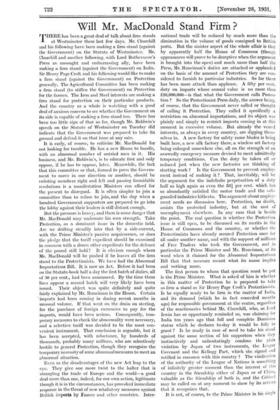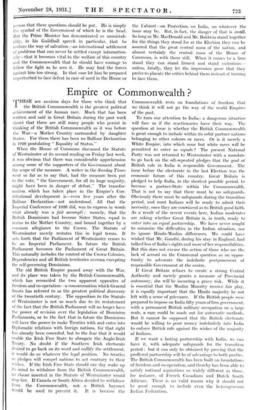Will Mr. MacDonald Stand Firm ?
THERE has been a great deal of talk about firm stands at Westminster these last few days. Mr. Churchill and his following have been making a firm stand (against the Government) on the Statute of Westminster. Mr. Churchill and another following, with Lord Rothermere's Press as unsought and embarrassing ally, have been making a firm stand (against the Government) on India. Sir Henry Page Croft and his following would like to make a firm stand (against the Government) on Protection generally. The Agricultural Committee has been making a firm stand (to stiffen the Government) on Protection for the farmer. The Iron and Steel interests are making a firm stand for protection on their particular products. And the country as a whole is watching with a good deal of anxious concern to see whether the Government on its side is capable of making a firm stand too. There has been too little sign of that so far, though Mr. Baldwin's speech on the Statute of Westminster on Tuesday did indicate that the Government was prepared to take its ground and defend it on that issue at any rate.
It is early, of course, to criticize Mr. MacDonald for not looking for trouble. He has a new House to handle, with an abnormal number of untried men in it. His business, and Mr. Baldwin's, is to educate first and only oppose, if he has to oppose, later. Meanwhile, the fact that this committee or that, formed to press the Govern- ment to move in one direction or another, should be enlisting members right and left and passing formidable resolutions is a manifestation Ministers can afford for the present to disregard. It is often simpler to join a committee than to refuse to join, and the day when a hundred Government supporters are prepared to go into the lobby against their leaders is still distant enough.
But the pressure is heavy, and there is some danger that Mr. MacDonald may underrate his own strength. Take Protection, as a dominant issue in the domestic field. Arc we drifting steadily into that by a side-current, with the Prime Minister's passive acquiescence, or does the pledge that the tariff expedient should be examined in common with a dozen other expedients for the defence of the pound still hold ? It is obvious enough where Mr. MacDonald will be pushed if he leaves all the firm stand to the Protectionists. We have had the Abnormal Importations Bill. It is now an Act. Before it had been on the Statute-book half a day the first batch of duties, all of 50 per cent., had been announced. By the time these lines appear a second batch will very likely have been issued. Their object was quite definitely and quite fairly explained by Mr. Runciman in the House. Certain -imports had been coming in during recent months in unusual volume. If that went on the drain on sterling, for the purchase of foreign currencies to pay for the imports, would have been serious. Consequently, tern- porary measures to check the abnormality were necessary, and a selective tariff was decided to be the most con- venient instrument. That conclusion is arguable, but it has been accepted, with reluctance, by hundreds of thousands, probably many millions, who are relentlessly hostile to general Protection, though they recognize the temporary necessity of some abnormal measures to meet an abnormal situation.
Even so the disadvantages of the new Act leap to the eye. They give one more twist to the halter that is strangling the trade of Europe and the world—a good deal more than one, indeed, for our own action, legitimate though it is in the circumstances, has provoked immediate response in the threat of new retaliatory measures against British imports by France and other countries. - Inter- national trade will be reduced by much more than the diminution in the volume of goods consigned to British ports. But the sinister aspect of the whole affair is that by apparently half the House of Commons (though appearances will prove to be deceptive when the argument is brought into the open) and much more than half the Press, Mr. Runciman's duties are attacked or applauded on the basis of the amount of Protection they are con- sidered to furnish to particular industries. So far there has been more attack than applause. A fifty per cent. duty on imports whose annual value is no more than £20,000,000—is that what the Government calls Protec- tion ? So the Protectionist Press daily, the answer being, of course, that the Government never called or thought of calling it Protection. They called it specifically a restriction on abnormal importations, and its object was plainly and simply to restrict imports coming in at this moment in excessive volume. But already the vested interests, as always in every country, are digging them- selves in. A new factory for safety razor blades is being built here, a new silk factory there, a wireless set factory being enlarged somewhere else, all on the strength of an avowedly emergency measure devised to meet admittedly temporary conditions. Can the duty be taken off or reduced just when the new factories arc thinking of starting work ? Is the Government to prevent employ- ment instead of making it ? That, inevitably, will be the argument for the indefinite perpetuation of a duty half as high again as even the 331 per cent. which has so abundantly satisfied the motor trade and the safe- guarded industries hitherto. The argument about employ- ment needs no discussion here. Protection, no doubt, assists the protected industry, but at the cost of unemployment elsewhere. In any case that is beside the point. The real question is whether the Protection issue is still open, to be discussed on its merits in the House of Commons and the country, or whether the Protectionists have already secured Protection once for all under another name, and with the support of millions of Free Traders who took the Government, and in particular the Prime Minister and Mr. Runciman, at its word when it claimed for the Abnormal Importations Bill that that measure meant what its name implies and nothing more.
The first person to whom that question must be put is the Prime Minister. What is asked of him is whether in this matter of Protection he is prepared to take as firm a stand as Sir Henry Page Croft's Protectionists. Is he equally ready to be firm in the matter of India, and its demand (which he in fact conceded months ago) for responsible government at the centre, regardless of the reactionaries behind Mr. Churchill, who, as Lord Irwin has so opportunely reminded us, was claiming for India ten years ago that full and complete Dominion status which he declares to-day it would be folly to grant ? Is he ready in case of need to take his stand against the same section of his supporters when they instinctively and unhesitatingly condone the plain violation by Japan of two instruments, the League Covenant and the Kellogg Pact, which she signed and ratified in common with this country ? The vindication of the authority of the League of Nations is something of infinitely greater moment than the interest of this country in the friendship either of Japan or of China, valuable .as the friendship of both is, and the Cabinet may be called on at any moment to show by its actions that it recognizes that. It is not, of course, to the Prime Minister in his single person that these questions should be put. He is simply the symbol of the Government of which he is the head. But the Prime Minister has demonstrated so unmistak- ably, in his Guildhall speech in particular, that he realizes the way of salvation—an international settlement of problems that can never be settled except internation- ally—that it becomes vital to the welfare of this country and the Commonwealth that he should have courage to follow the light as he sees it. He may find the forces against him too strong. In that case let him be prepared unperturbed to face defeat in case of need in the House or the Cabinet—on Protection, on India, on whatever the issue-may be. But, in fact, the danger of that is small. So long as Mr. MacDonald and Mr. Baldwin stand together for the things they stood for at the Election they can be assured that the great central mass of the nation, and almost certainly the central mass of the House of Commons, is with them still. When it comes to a firm stand they can stand firmest and stand victorious— unless, fatally, they let the impression grow that they prefer to placate the critics behind them instead of turning to face them.







































 Previous page
Previous page